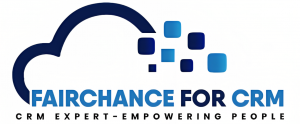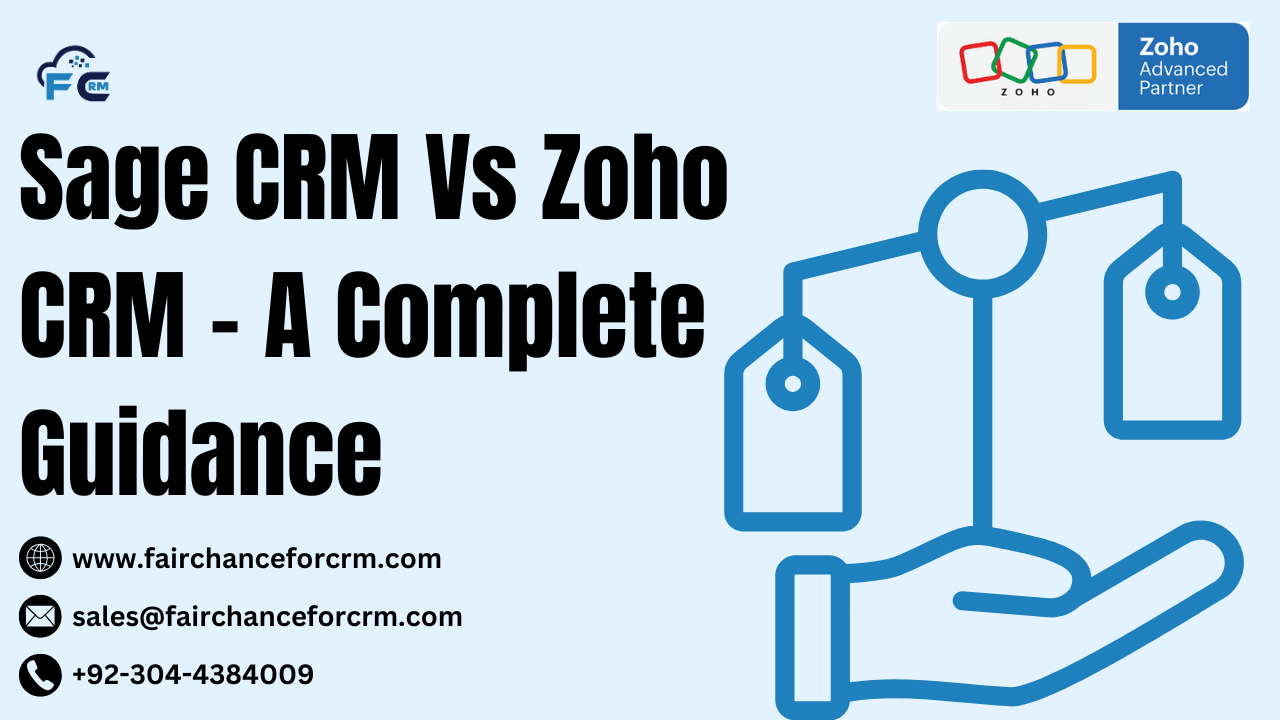When comparing Sage CRM Vs Zoho CRM, both platforms offer robust features designed to help businesses manage customer relationships, sales processes, and marketing efforts. However, there are key differences that could make one a better fit for your needs. Here’s a breakdown of their differences across various aspects:
Also Read:
- Odoo Careers: A Path to Growth and Innovation in the World of ERP
- A Comprehensive Guide to the Odoo Manual
- Wealthbox CRM vs Zoho CRM: A Comprehensive Comparison
- Zoho Chat Online: A Comprehensive Guide to Zoho’s Live Chat
- Zoho Inventory – A Comprehensive Guide For Growth
Sage CRM Vs Zoho CRM – A Complete Guidance
1. Overview
- Sage CRM:
- A customer relationship management system that focuses on streamlining sales, marketing, and customer service processes for small to medium-sized businesses. It integrates well with other Sage ERP (Enterprise Resource Planning) solutions, making it a good choice for businesses already using Sage products.
- It’s available as both on-premise and cloud-based solutions.
- Zoho CRM:
- A popular cloud-based CRM solution with a broad feature set designed for small to mid-sized businesses. It offers flexible customization, automation, and AI-powered tools, making it a strong choice for growing businesses across multiple industries.
- It has a larger user base and integrates well with various third-party tools.
2. Key Features
- Sage CRM:
- Sales Management: Provides tools to manage leads, opportunities, quotes, and orders.
- Customer Support: Includes customer service modules for managing support requests and cases.
- Reporting and Analytics: Customizable reporting options to track sales, service, and marketing performance.
- Integrations: Seamless integration with Sage ERP and accounting solutions.
- Customization: Allows for customization of workflows and user interface.
- Deployment: Offers both cloud and on-premise deployment options.
- Zoho CRM:
- Sales Automation: Comprehensive lead management, pipeline management, and sales forecasting tools.
- Customer Support: Built-in tools for managing customer support tickets, live chat, and email interactions.
- Marketing Automation: Strong marketing automation tools, including email campaigns, lead nurturing, and workflow automation.
- Artificial Intelligence: Zia, Zoho’s AI assistant, offers predictive sales analytics, sentiment analysis, and task automation.
- Mobile App: Fully functional mobile app for sales and customer service on the go.
- Integrations: Integrates with over 500 third-party apps, including Google Workspace, Microsoft 365, and social media platforms.
3. User Interface
- Sage CRM:
- Sage CRM has a more traditional interface, which may feel more familiar to users who are used to enterprise-level software. It’s a bit more rigid compared to Zoho, especially if you’re looking for highly customizable user experiences.
- Zoho CRM:
- Zoho’s user interface is modern and highly intuitive. It offers flexible dashboards, easy customization, and an aesthetically pleasing design that can adapt to various business needs. It’s generally seen as more user-friendly.
4. Customization and Flexibility
- Sage CRM:
- While Sage CRM offers customization, it tends to be more rigid in terms of flexibility and might require more technical expertise, especially if you want to make deep customizations. It’s great for businesses with complex needs, especially if integrated with Sage ERP.
- Zoho CRM:
- Zoho offers a higher degree of customization, allowing users to customize workflows, fields, reports, and dashboards with relative ease. It is highly flexible and can be tailored to fit the specific needs of different industries and business models.
5. Automation
- Sage CRM:
- Sage CRM offers workflow automation for managing sales processes, but it might not be as sophisticated or as user-friendly as Zoho’s automation features.
- Zoho CRM:
- Zoho excels in automation. From email automation to workflow rules and task automation, Zoho makes it easy to automate tasks and processes. Its AI-powered assistant, Zia, can predict sales trends, recommend actions, and automate repetitive tasks.
6. Pricing -Sage CRM Vs Zoho CRM
- Sage CRM:
- Sage CRM’s pricing can be somewhat complex, as it depends on whether you choose the cloud or on-premise version. For the cloud version, pricing generally starts at around $40–$60 per user/month for the basic plans, and goes up depending on the features and number of users.
- On-premise pricing may require a larger upfront investment for licenses and installation, as well as additional maintenance costs.
- Zoho CRM:
- Zoho CRM has a more transparent pricing structure and is generally more affordable than Sage CRM. It offers a free plan for up to 3 users, which is ideal for small teams. Paid plans start at:
- $14 per user/month for the Standard plan
- $23 per user/month for the Professional plan
- $40 per user/month for the Enterprise plan
- $52 per user/month for the Ultimate plan
Zoho also offers a free trial of 15 days for all its paid plans, so you can test out the features before committing.
- Zoho CRM has a more transparent pricing structure and is generally more affordable than Sage CRM. It offers a free plan for up to 3 users, which is ideal for small teams. Paid plans start at:
7. Customer Support – Sage CRM Vs Zoho CRM
- Sage CRM:
- Provides customer support through email, phone, and online resources. Support is often praised for its responsiveness, but depending on your plan, you may need to pay for higher-tier support.
- Zoho CRM:
- Zoho offers extensive customer support options, including 24/7 support (for higher-tier plans), chat support, email, phone, and a large online knowledge base. Zoho’s support is generally highly rated for its responsiveness and thoroughness.
8. Integrations
- Sage CRM:
- Sage CRM integrates well with other Sage software, including accounting and ERP solutions, which can be a significant advantage for businesses already using those tools. It also offers integrations with third-party apps but may not have the same breadth of integration options as Zoho.
- Zoho CRM:
- Zoho CRM offers a wide range of integrations with third-party apps, including popular tools like Google Workspace, Microsoft 365, social media platforms, payment gateways, and more. This makes it very versatile in a wide range of business environments.
9. Scalability
- Sage CRM:
- Sage CRM is quite scalable and suitable for businesses looking for a more traditional CRM solution that can handle complex processes and integrations with ERP systems. It’s ideal for businesses that may eventually need to grow into an enterprise-level CRM.
- Zoho CRM:
- Zoho CRM is also scalable and can cater to businesses of various sizes, from small startups to larger enterprises. It’s more flexible in terms of growth, thanks to its cloud-based nature and extensive customization options.
Which One is Better – Sage CRM Vs Zoho CRM ?
- Sage CRM is ideal for businesses already using Sage ERP systems, as it integrates seamlessly with other Sage software. If you’re running a business with complex accounting or ERP needs and need a CRM solution that can complement that, Sage CRM would be a good fit. It’s also suitable for businesses that need both cloud and on-premise deployment options.
- Zoho CRM, on the other hand, is better for businesses looking for an affordable, highly customizable, and easy-to-use CRM system. It’s especially suitable for small to mid-sized businesses that need strong sales automation, AI-powered insights, and a broad set of integrations. Zoho CRM is a more modern, flexible, and feature-rich solution that can grow with your business.
Conclusion:
If you prioritize ease of use, automation, integrations, and affordability, Zoho CRM is likely the better option, especially for small to medium-sized businesses. If you need complex ERP integration, are already using Sage products, and prefer a more traditional setup, then Sage CRM may be more suitable.
For more information about the Sage CRM Vs Zoho CRM: visit this link.
If you want to Free Trail Zoho, click on this link.




